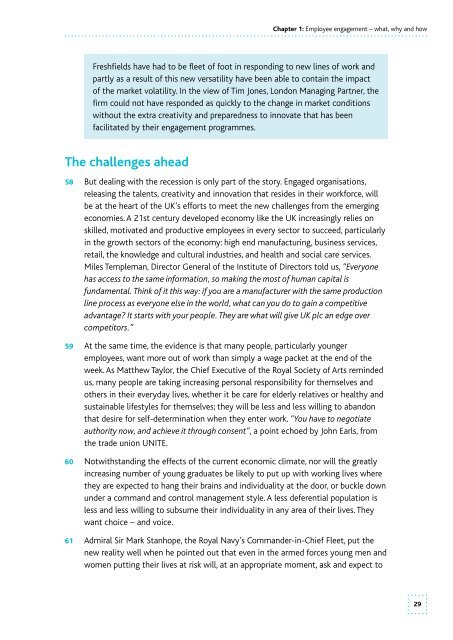3ytgeaf
3ytgeaf
3ytgeaf
You also want an ePaper? Increase the reach of your titles
YUMPU automatically turns print PDFs into web optimized ePapers that Google loves.
Chapter 1: Employee engagement – what, why and how<br />
Freshfields have had to be fleet of foot in responding to new lines of work and<br />
partly as a result of this new versatility have been able to contain the impact<br />
of the market volatility. In the view of Tim Jones, London Managing Partner, the<br />
firm could not have responded as quickly to the change in market conditions<br />
without the extra creativity and preparedness to innovate that has been<br />
facilitated by their engagement programmes.<br />
The challenges ahead<br />
58 But dealing with the recession is only part of the story. Engaged organisations,<br />
releasing the talents, creativity and innovation that resides in their workforce, will<br />
be at the heart of the UK’s efforts to meet the new challenges from the emerging<br />
economies. A 21st century developed economy like the UK increasingly relies on<br />
skilled, motivated and productive employees in every sector to succeed, particularly<br />
in the growth sectors of the economy: high end manufacturing, business services,<br />
retail, the knowledge and cultural industries, and health and social care services.<br />
Miles Templeman, Director General of the Institute of Directors told us, “Everyone<br />
has access to the same information, so making the most of human capital is<br />
fundamental. Think of it this way: if you are a manufacturer with the same production<br />
line process as everyone else in the world, what can you do to gain a competitive<br />
advantage It starts with your people. They are what will give UK plc an edge over<br />
competitors.”<br />
59 At the same time, the evidence is that many people, particularly younger<br />
employees, want more out of work than simply a wage packet at the end of the<br />
week. As Matthew Taylor, the Chief Executive of the Royal Society of Arts reminded<br />
us, many people are taking increasing personal responsibility for themselves and<br />
others in their everyday lives, whether it be care for elderly relatives or healthy and<br />
sustainable lifestyles for themselves; they will be less and less willing to abandon<br />
that desire for self-determination when they enter work. “You have to negotiate<br />
authority now, and achieve it through consent”, a point echoed by John Earls, from<br />
the trade union UNITE.<br />
60 Notwithstanding the effects of the current economic climate, nor will the greatly<br />
increasing number of young graduates be likely to put up with working lives where<br />
they are expected to hang their brains and individuality at the door, or buckle down<br />
under a command and control management style. A less deferential population is<br />
less and less willing to subsume their individuality in any area of their lives. They<br />
want choice – and voice.<br />
61 Admiral Sir Mark Stanhope, the Royal Navy’s Commander-in-Chief Fleet, put the<br />
new reality well when he pointed out that even in the armed forces young men and<br />
women putting their lives at risk will, at an appropriate moment, ask and expect to<br />
29


